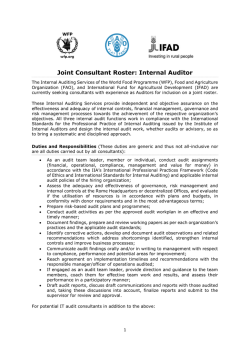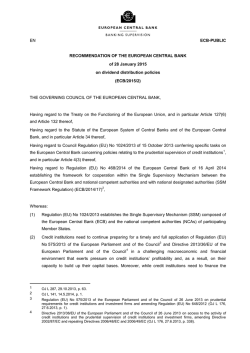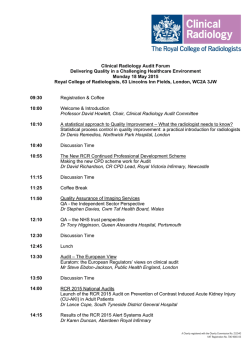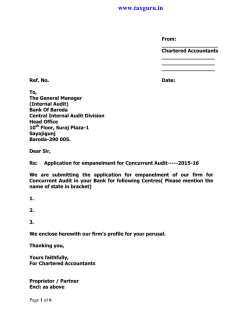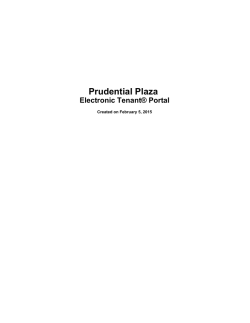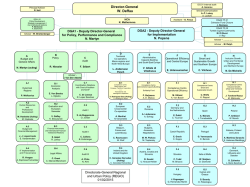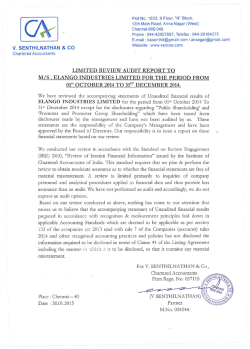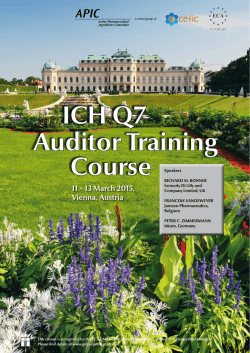
Introduction to Panel 3: Responses to the Global Financial Crisis
30.09.2015 Introduction to Panel 3: Responses to the Global Financial Crisis 10th PIOB Anniversary Seminar: Future Challenges in Audit Oversight /Public Interest Oversight Board Fernando Restoy Deputy Governor Good afternoon and welcome back to the sessions being held here today, in this event celebrating the 10th anniversary of PIOB. During the next 90 minutes, I will be the moderator of Panel 3, which is devoted to the Responses to the Global Financial Crisis. I am delighted to share this panel with David Wright, Stephen Haddrill and Steven Maijoor, three outstanding professionals and much-appreciated colleagues whom I will be properly introducing in a few minutes. I would like to start by expressing my gratitude to PIOB, and in particular to Eddy and Gonzalo, for inviting me to share this anniversary with you. I understand that I have been asked to chair this panel not just because of my current position as Deputy Governor of the Banco de España, but also in my former capacity as chairman of the Monitoring Group of the so-called IFAC structure, which has the task of monitoring the PIOB’s activities. I cannot stress enough the job performed by the PIOB over recent years in its task of ensuring that the public interest is properly taken into account in the standard-setting process. Actually, the recent financial crisis has once again revealed the relevant role that standard-setters play, together with auditors and enforcers, to retain market participants’ confidence. I do believe that standard-setters in the field of financial information and auditing have done a good job in trying to cope with the deficiencies identified during the financial crisis. Indeed, the recent crisis –in a similar way to other, past crises- has triggered quite an intense debate on the role of financial reporting and the extent to which financial stability considerations should be taken into account when deciding on accounting standards. In particular, recurrent topics of the discussions have been the scope of fair value accounting and the methods to address loan impairments. Naturally, prudential supervisors often voice concerns on the unintended volatility of the profit and loss account that some accounting standards could prompt. Regulators tend to prefer more prudent and forward-looking accounting principles that provide for a smoother and less pro-cyclical evolution of firms’ income by relying more on amortised cost valuations and a timelier recognition of emerging loan losses. By contrast, with a view to enhancing the information power of financial statements, securities regulators and accounting standard-setters have traditionally favoured valuation approaches more closely linked to market values and have been reluctant to adopt measurement criteria that could artificially blur the natural variability of firms’ income. In that debate, I have always thought – somewhat contrary to the prevailing view in the prudential community to which I currently belong – that directly introducing financial stability considerations in accounting standards would taint the realm of financial 3/6 reporting; financial reporting principles should remain focused on providing investors and fund providers with the best possible view of the economic reality of the firm. Moreover, the financial stability concerns of prudential regulators are not, in my opinion, best served by interfering with the way reporting standards establish the determination of firms’ income. It would be much more appropriate to add, outside the financial statements, the proper filters to accounting figures to derive adequate solvency indicators. Those solvency indicators should be the basis of prudential policy. And that, in turn, should not be confined to requiring more or less capital but should also involve restricting dividend distribution when appropriate and adopting other prudential measures which, if possible, could help mitigate the pro-cyclical behaviour of banks. Fortunately, recent developments in both accounting and prudential standard-setting have considerably reduced the apparent divergence. In particular, by replacing the incurredloss concept with the more forward-looking expected-loss approach for impairments, accounting standards have not only pleased prudential regulators but they have also substantially enhanced the reported valuation accuracy of assets measured at amortised cost. Similarly, the Basel III Accord, by introducing countercyclical and conservation buffers above minimum required capital, and by regulating more thoroughly dividend payouts, has widened the supervisors’ toolkit and enhanced its effectiveness in addressing financial stability concerns. I believe these are very positive developments, and ones that have helped reduce somewhat the intensity of the debate among different standard-setters on the contents and objectives of financial reporting. It is positive, too, how the financial crisis has fuelled the ongoing revision and improvement of international auditing standards. In particular, I would like to mention the more explicit application guidance for the audit of disclosures, and for the auditor’s response to non-compliance with laws and regulations, together with the new requirements regarding auditor reporting standards. This latest revision responds to calls from users of audited financial statements for more informative auditor’s reports. The communication of “key audit matters” and greater transparency about the auditor’s work are important steps along the path towards more meaningful and useful audit reports. Yet one area in which much less progress has been made is in the convergence of accounting and audit standards. It is certainly regrettable that, despite all efforts, the adoption of IFRSs around the world – while evolving positively – is still far from complete. More importantly, the convergence of IFRSs and US GAAPs have not advanced much over the last few years, despite the significant intensity of the technical dialogue between the IASB and the FASB. The evident distance between the approaches taken by both standard-setters on relevant matters, such as insurance and, especially, financial instruments, is admittedly disappointing. And this is obviously a setback for the process of integration of capital markets. 6 4/6 As a prudential regulator, the absence of homogeneous accounting standards is also very unwelcome. As you all know, there has been a huge effort at the global level to strengthen the regulatory framework by establishing new common requirements that would ensure the availability of more and better capital in the balance sheets of financial institutions. In addition, the FSB has developed new resolvability requirements that will entail significant constraints on the composition of banks’ funding. All these new common requirements, while extremely positive for facilitating financial stability worldwide, may actually generate significant competitive distortions if not applied homogeneously around the world. In particular, insofar as the new requirements are imposed on variables (such as own funds, balance sheet size, etc) stemming from accounting reports, a discrepancy in accounting methods does actually imply a heterogeneous application of the common prudential standards. Even in the IFRS world, additional effort should be devoted to ensuring a homogeneous interpretation of accounting principles. For instance, within the euro zone, where IFRSs are compulsory for the consolidated balance sheets of firms participating in regulated markets, the situation is far from perfect. Indeed, in the Asset Quality Review (AQR) of SSM banks, published last October, most of the incidences found were not the consequence of infringements of the prevailing accounting rules but the result of different accounting practices followed by banks and accepted by auditors and supervisors in their jurisdictions. As you can imagine, in a context in which much is being done to minimise discrepancies in the prudential regulations applied in each Member State, it seems essential to seek also more common accounting practices that could help derive the relevant indicators underpinning the prudential policies on a common basis. Interestingly, the areas in which discrepancies are more significant are those relating to recognition of impairment, which are obviously of great prudential relevance. According to IFIAR surveys, this is also the area in which most audit deficiencies are found. With the prospect of the application of IFRS 9 in 2018, and given the increased need for expert judgment to apply this standard, much needs to be done to ensure a consistent application of the new impairment rules. In particular, robust disclosures and further auditing and supervisory guidance on the implementation of IFRS 9 would foster comparability and consistency. I will conclude here and, without further delay, allow me to introduce you to our distinguished panellists today. Our first panellist, by speaking order, is David Wright, secretary general of IOSCO since March 2012. He assumed this responsibility after having pursued a very long, dedicated and successful career in the European Commission, in the field of financial services. Our second panellist is Stephen Haddrill, chief executive officer of the FRC (Financial Reporting Council of the UK) since November 2009, following prior responsibilities as director general of the Association of British Insurers and director general of the Fair Markets Group at the Department of Trade and Industry. I think we met when we both participated in the Financial Crisis Advisory Group – the high-level group set up by the 5/6 International Accounting Standards Board and the Financial Accounting Standards Board to consider financial reporting issues arising from the global financial crisis. Finally, our third panellist is Steven Maijoor, Chair of ESMA (European Securities and Markets Authority) since 2011. He assumed this position after having been managing director at the Netherlands Authority for the Financial Markets, where he was responsible for capital markets supervision. Let me just add, before giving the floor to our first panellist, that David Wright, Stephen Haddrill and Steven Maijoor will have 15 minutes each to present their views, and after their interventions, we will have 30 minutes for questions and answers. Now, without any further delay, David, the floor is yours. 6 6/6
© Copyright 2026

